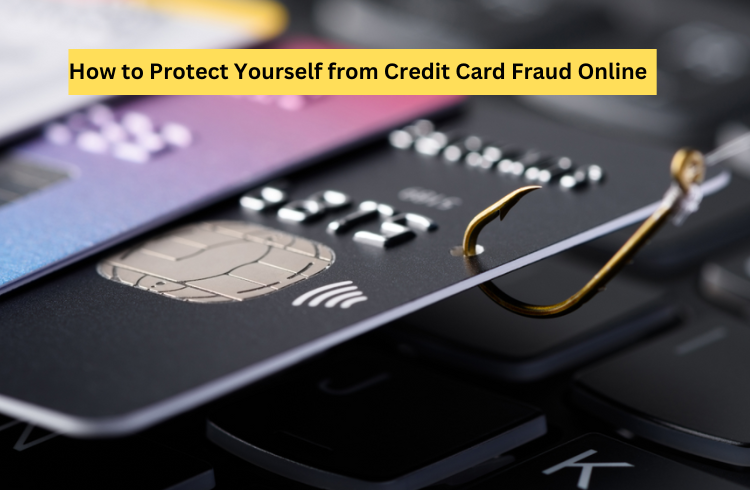How to Protect Yourself from Credit Card Fraud Online?
Online buying’s ease in the digital era carries a drawback: credit card fraud. The danger of becoming prey to cybercriminals has increased as more people welcome internet transactions. This book will offer you basic advice and techniques on How to Protect Yourself from Credit Card Fraud Online. Knowing the risks and putting precautionary actions into effect will help you to shop peace of mind and confidence.
The Increasing Danger Credit Card Fraud poses
One developing issue is credit card fraud. Because personal data is so easily available online, criminals find it easier to take advantage of naive victims. Recent figures indicate that credit card theft affects millions of people annually and causes losses of billions of dollars. First step in how to guard yourself from credit card theft online is realizing this issue.
Why Should You Act Right Now?
Many people believe they won’t experience fraud or they are immune to it. Sadly, this kind of thinking could cause complacency and make you a target for simple attack. From phishing emails to bogus websites, fraudsters utilize advanced methods to pilfers your credit card data. Ignoring these hazards could have disastrous financial results like lowered credit ratings and identity theft.
Key Learnable: Act before you have become victim. Understanding how to guard yourself from credit card fraud online will save time, money, and stress.
Spotting Credit Card Fraud Signs
Identifying the warning indicators is the first step toward how to guard yourself from credit card theft online. Unexpected charges, unusual accounts, or odd bank correspondence are just a few of the several ways fraud can show up. Here’s what to watch for:
One should routinely review their credit card bills for unauthorized transactions. Should you come across charges you cannot identify, they could point to fraud.
- suspicious messages or emails: Emails or texts purportedly from your bank asking for personal information or urging you to open links should be avoided.
If you see changes to your account settings or if new accounts show under your name, you should investigate right away.
Unexpected declines in your credit score could point to someone utilizing your information improperly.
Right Actions to Do Right Now
If you have suspicions about fraud, calm yourself. These quick actions should help you:
Report any illegal transactions and ask about account security Your Bank.
Change Your Passwords : Change your email passwords and online banking to improve security.
Track Your Credit Reports : Check your credit reports often for unusual behavior.
Protecting your financial situation depends on knowing the warning indicators of credit card fraud. Your best defense against identity theft is knowledge of how to guard yourself from credit card fraud online.
Steps to Guard Against Online Credit Card Theft
A good password is your first line of protection against fraud. Using letters, numbers, and special characters, craft passwords that are challenging to figure out. Steer clear of including personal information—like birthdays—into your passwords.
Activate two-factor authentication (2FA) on your accounts anywhere you can. By requiring a second kind of verification—a code texted to your mobile device—this offers even more security.
Make sure the website is secure before submitting your payment card information. Search the URL for “https://” and check the address bar for a padlock icon denoting encrypted access to your data.
Steer clear of making financial transactions on public Wi-Fi networks. On unprotected systems, cybercrime can readily intercept your data. Should you have to utilize public Wi-Fi, think about encrypting your connection using a Virtual Private Network (VPN).
- Track Your Accounts: Frequent inspection of your credit card and bank statements will enable you to identify early illegal activity. To keep informed, set alarms for any transactions above a designated limit.
- Use Virtual Credit Card Numbers: Certain banks let internet buyers access virtual credit card numbers. These temporary numbers might help guard your real card information online.
Educate Yourself About Phishing Scams
Learn to spot phishing emails and communications to Educate Yourself About Phishing Scams. Look for things like bad grammar, bland welcomes, and dubious links. If an email seems strange, avoid clicking on any links or offering any personal information.
- Be Careful with Downloads: Steer clear of downloading programs or tools from untested sites. Malicious software can compromise the security of your device, therefore facilitating the access to credit card data by criminals.
Install antivirus programs to guard your devices from viruses and other hazards. Frequent updates of your operating systems and applications help to fix any flaws.
- Check Your Credit Report : Look over your credit report often for any odd activity. Every one of the three main credit bureaus entitles you access a free credit report once year. Take advantage of this chance to spot early indications of fraud.
Recap: By acting pro-actively, you greatly lower your chance of credit card fraud victimisation. You will be more suited to guard yourself from any losses the more efforts you take to safeguard your personal data.
Actions to How to Protect Yourself from Credit Card Fraud Online
Your greatest efforts nevertheless still run the risk of you becoming a victim of credit card fraud. Should it occur, follow this:
To report any illegal activity, Report the Fraud Immediately by calling your bank or credit card company. Most organizations have specific fraud departments on hand to help you.
Go over your most current credit card and bank statements to find all illegal activity.
- Freeze Your Credit : To stop fresh accounts opening under your name, think about freezing your credit records.
Should your identity have been hacked, file a report to the Federal Trade Commission (FTC) at IdentityTheft.gov.
- Track Your Accounts : Keep a watchful eye on them for any more illegal behavior.
In the digital terrain of today, knowing how to guard oneself from credit card fraud online is really vital. Using the techniques described in this book can help you greatly lower your chance of becoming victim of credit card theft. Remember, essential is vigilance. If you believe something is off, keep educated, use caution, and don’t hesitate to act.
Protecting yourself from credit card fraud online requires, all things considered, being proactive about your security and keeping informed of the hazards. Your awareness and behavior may greatly help to keep your financial data safe whether that means choosing strong passwords, checking your accounts, or knowing what to do should fraud occur. Regular application of these techniques will help you to negotiate the internet world with confidence and peace of mind.

